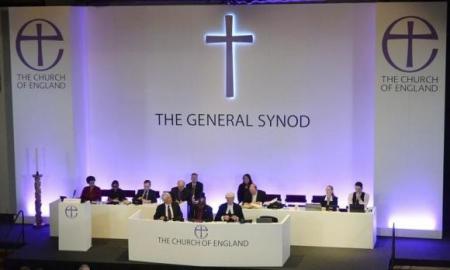Church of England Approves Women Bishops in Historic Vote; Theological Debate Expected to Continue

The General Synod of the Church of England voted in favor of approving women bishops for the first time in its history on Monday, receiving the required two-thirds majority. While many Anglican leaders have praised the significant move, they and others have warned that the theological debate on women's place in the Church will continue.
"The challenge for us will be for the church to model good disagreement and to continue to demonstrate love for those who disagree on theological grounds. Very few institutions achieve this, but if we manage this we will be living our more fully the call of Jesus Christ to love one another. As delighted as I am for the outcome of this vote I am also mindful of those within the Church for whom the result will be difficult and a cause of sorrow," said the Archbishop of Archbishop of Canterbury, Justin Welby.
"My aim, and I believe the aim of the whole church, should be to be able to offer a place of welcome and growth for all. Today is a time of blessing and gift from God and thus of generosity. It is not winner take all, but in love a time for the family to move on together."
The results, broken down by the three constituent parts of the Synod, were as follows: 37 votes in the House of Bishops supported women bishops, two did not, and there was one abstention; 162 votes in the House of Clergy were in support, 25 were not, and there were four abstentions; 152 votes in the House of Laity supported the move, 45 did not, and there were five abstentions.
Monday's vote came 18 months following the last proposal failed to pass in November 2012, when less than two thirds majority of the House of Laity supported the move.
Those who voted against women becoming bishops, such as lay member of the Synod Lorna Ashworth, warned that it is "not going to be a smooth road ahead," BBC News reported.
Ashworth said that she does not plan to leave the Church, but predicted that some of the difficulties ahead will involve new priests who are opposed to such a change.
Susie Leafe, director of the conservative evangelical group Reform, who is also a lay member, added that she was "very disappointed" by the vote.
"There is still at least a quarter of the Church for whom this package does not provide for their theological convictions," Leafe said.
While the push in the Anglican Communion to allow women to be considered for the highest positions in the church has been going on for decades, conservatives have said that such a move would not be biblical and would not align with Jesus selecting only males to serve as his disciples.
As with the majority vote, most Church of England leaders continued praising the results.
"This is a momentous day. Generations of women have served the Lord faithfully in the Church of England for centuries. It is a moment of joy today: the office of Bishop is open to them," said the Archbishop of York, Dr. John Sentamu.
"To those who ask 'what took you so long?' my answer is that every decision has a cost and there will be those within our body who will be hurting as a result of this decision. Our answer to the hurting should not be 'get over it' but rather 'we will not let go until you have blessed us,'" he continued.
"We move slowly because we move together. But in moving together we achieve not only what is just but also model what is right. As the African Proverb says: 'Whoever walks fast, travels alone. Whoever walks far, walks in the company of others.'"
The Church of Wales voted to legalize women bishops in September 2013, which further increased pressure on the larger Church of England to follow suit.
The first woman to be appointed bishop could happen as early as by the end of the year. The Telegraph noted that some of the women who could be considered include the Very Rev. Vivienne Faull, the Dean of York; her counterpart in Norwich, the Very Rev. Dr Jane Hedges, or the Dean of Salisbury, the Very Rev. Dr June Osborne.





















